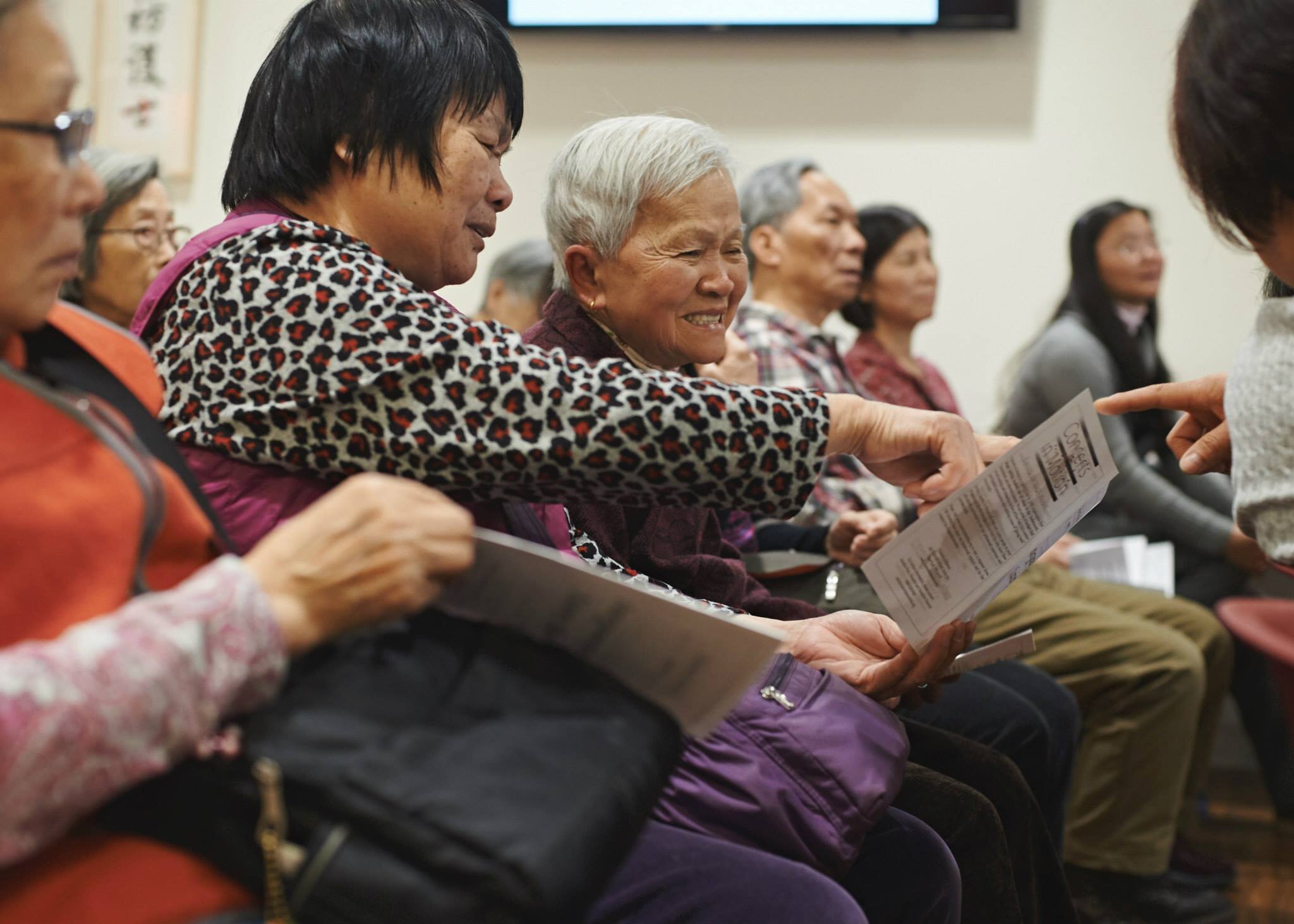Frequently Asked
Questions
+ What is the Person-Centered Trauma-Informed Care approach?
Person Centered Trauma Informed Care, or PCTIC, is a holistic, strengths-based approach that promotes the dignity, strength, and empowerment of those who have experienced trauma. The guiding principle of PCTIC is that the traumatized person is an expert in what their care needs are. PCTIC was developed as a care approach to care for Holocaust Survivors. We were originally trained in PCTIC by UJA Federation NY, and with their guidance, we now apply the principles of PCTIC across all our work -- which distinguishes Concerts in Motion from other arts-based organizations serving vulnerable populations.
PCTIC rose to importance when in a 1995-97 study, Dr. Robert Anda and Dr. Vincent Felitti surveyed over 17,000 adults about their exposure to ten categories of abuse, neglect and household dysfunction during their childhood. Using the survey, physical exams and an ongoing tracking of the adults’ health showed a strong correlation between childhood trauma and poor health outcomes decades later. Because of the long-lasting impact and prevalence of adverse childhood experiences, trauma-informed care is applied now in a wide range of settings.
How we apply Person-Centered, Trauma-Informed Care in our concert programs:
- Students, adult volunteers and pro musicians performing in our outreach learn through Concerts in Motion’s PCTIC training how to listen for concert recipients’ impressions and lived experience during engagement time, while acknowledging that a recipient’s experience is different from their own.
- The tenets of this approach - Empathy, Respect and Integrity - inform all of Concerts in Motion’s programming.
- Every concert we present integrates music and engagement in order to celebrate the dignity of the concert recipient.
- PCTIC provides a framework for our musicians so that they can thoughtfully select repertoire and meaningfully engage with our recipients. Our concerts have a profound impact on those we reach.
+ What is social isolation?
Social isolation is defined by the US Institute of Medicine’s Division of Health Promotion and Disease Prevention as:
“An absence of social interactions, contacts, and relationships with family and friends, with neighbors on an individual level, and with society at large on a broader level.”
Social isolation puts both physical and mental health at risk. Evidence shows that social isolation is as dangerous to your health as smoking.
According to the Journals of Gerontology, socially disconnected and lonely individuals tend to suffer higher rates of morbidity and mortality as well as infection, depression, and cognitive decline. The CDC finds that Social isolation is associated with about a 50% increased risk of dementia and other serious medical conditions—and older adults from vulnerable populations, like LGBTQ+ and immigrant communities, are at a greater risk of social isolation.
However—the mere presence of another individual can alleviate the effects of stress and isolation.
+ How widespread is social isolation?
The CDC estimates that almost 1/4 of older adults are considered to be socially isolated—and the older adult population is growing rapidly.
Census Bureau data shows us how demographics are shifting and why it’s important to understand the impact of social isolation among older adults. By 2030:
- Older people will outnumber children for the first time in history.
- One in every five Americans will be retirement aged.
- Adults aged 65 and older will grow to 1.35 million, representing 16% of New York City’s total population.
+ How does music help us?
There’s good news—Concerts in Motion’s high-quality, thoughtfully-developed music programs and concerts can alleviate social isolation.
The part of the brain that processes music is one of the last to be affected by cognitive decline and dementia. Music can reach individuals experiencing cognitive decline and spark memories, bring moments of joy and connection, and ease isolation.
Research by Generations United suggests that meaningful intergenerational engagement and cross-age relationships can decrease social isolation among older adults and boost feelings of belonging, self-esteem, and well-being.
Music education greatly enhances learning abilities for students. Correlated growth points named by the Arts Education Partnership include:
- Achievement in other core academic subjects, including math, and Language Arts
- Enhanced fine motor skills
- Improved working memory and recall and retention of verbal information
- Improved SAT scores
- Sharpened student attentiveness
- Strengthened perseverance and self esteem And perhaps most importantly, music education cultivates the creative capacities for lifelong success.
We are proud grantees of the We Are All Music Foundation, which hosts a library of research on the benfits of music.
+ How do I join the audience?
We’d be happy to have you in the audience. See our Concerts Signup Form to get involved.
+ I’m a social worker—how can I get my clients involved?
Let’s start with a conversation, so we can learn more about your community and how to best serve you.
+ I’m a musician—how can I get involved?
All of the musicians on our roster are consummate professionals, and employees of CiM. To contact our Musician Manager or learn more about the hiring process, see our Professional Musicians Page.
+ How can I help?
Your support makes our work possible. There are lots of ways to support, from making a donation in honor of a loved one, to choosing Concerts in Motion as your Amazon Smile charity. Learn how you can make a difference.
Further Reading
Deeply Empathetic People Process Music Differently in their Brains
Loneliness and Social Isolation Linked to Serious Health Conditions
The U.S. Population is Older Than It Has Ever Been (The New York Times)
Intergenerational Programs as a Tool to Advance Equity (Generations Journal)
Tweak in City Contract Leaves Scores of Queens Residents Without Rides to Senior Centers (The City)

Have more questions?
If you’d like to learn more about
Concerts in Motion, please contact us below.
